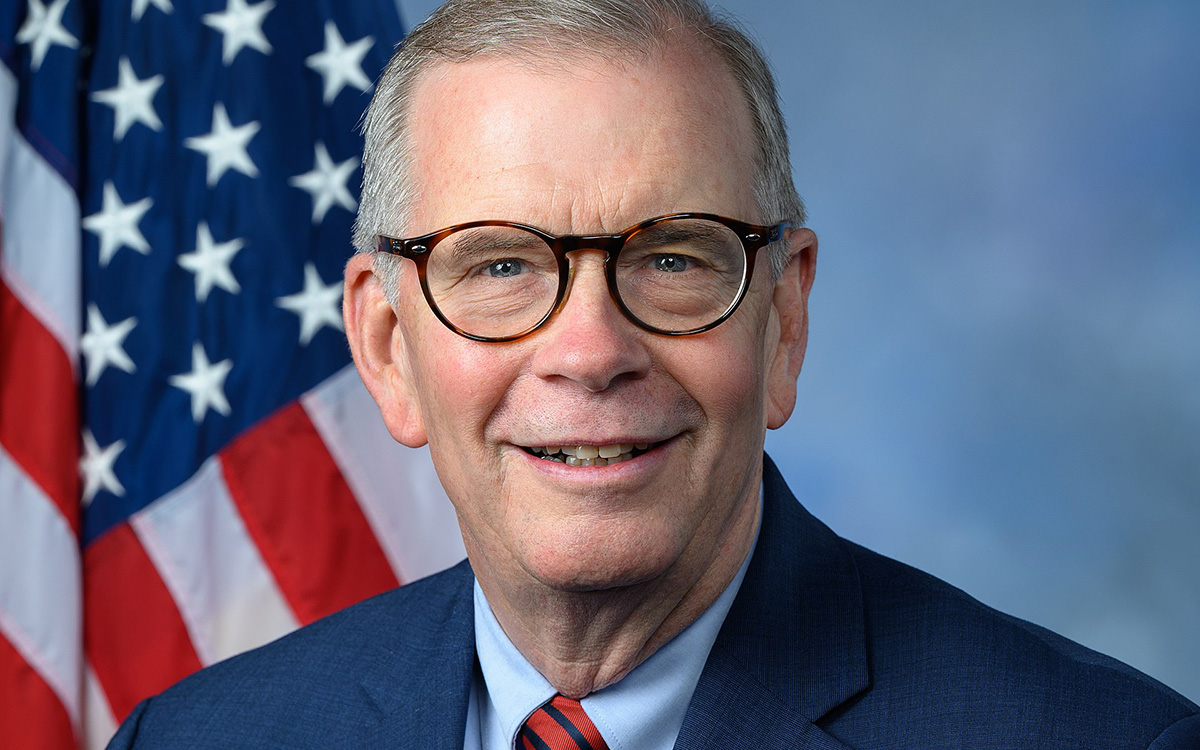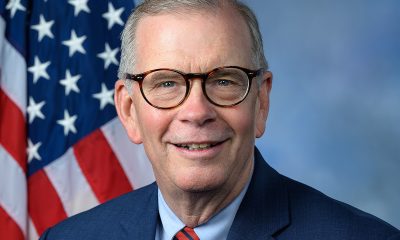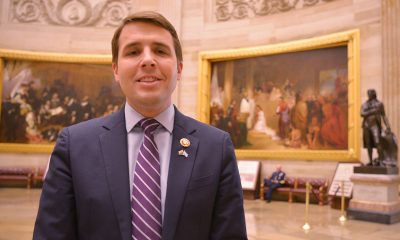Congress
Before TikTok, the U.S. took action over national security concerns with Grindr
House voted to pass TikTok ban on Wednesday

In a bipartisan vote of 352-65 on Wednesday, the U.S. House of Representatives cleared a bill that would force a divestiture of TikTok by its Chinese parent company ByteDance or ban the video sharing platform’s use in the U.S.
While the legislation faces an uncertain path to passage in the U.S. Senate, Wednesday’s vote provided additional evidence of the extent to which lawmakers are concerned about U.S. national security risks that could stem from TikTok.
More specifically, as recent years have seen relations between the U.S. and China become more fraught than they have been since the two countries first established diplomatic ties in 1979, questions have been raised about the access government leaders in Beijing might have to data from America’s 150 million TikTok users who are active on the platform each month.
Concerns have also been raised about whether and how the platform’s content moderation policies, algorithmic recommendation engine or other features might be manipulated to advance Chinese interests — including, potentially, by sowing political strife in the U.S. or manipulating or undermining American elections.
Many of these claims are speculative, lacking the type of evidence that might be required if they were presented in a court of law. Nevertheless, for purposes of forcing a divestiture through an act of Congress or a decision by the Committee on Foreign Investment in the United States, they are sufficient.
CFIUS is a nine-member interagency panel that adjudicates questions of whether business transactions between foreign buyers and U.S. targets may raise national security concerns. Since 2020, the committee has investigated TikTok because the platform was created by ByteDance’s 2017 purchase of U.S. startup Musical.ly.
The probe led to negotiations over a deal in which American user data from TikTok would be sold to U.S. based multinational computer technology company Oracle, which would vet and monitor the platform’s algorithms and content moderation practices — but Axios reported on Monday that talks between TikTok and CFIUS have stalled for months.
Parallels to Grindr case
As directed by CFIUS, in 2020, Grindr, the location-based app used primarily by gay and bisexual men and transgender or gender diverse communities, was sold by the Chinese-based Beijing Kunlun Tech to San Vicente Acquisition, a firm that was incorporated in Delaware.
According to Reuters, Kunlun’s failure to notify CFIUS when the company purchased Grindr in 2018 was likely one of the reasons the committee decided to force the divestiture and thereby unwind an acquisition that, by that point, had been consummated for two years.
While CFIUS does not share details about the specific nature of national security risks identified with transactions under its review, reporting at the time suggested concerns with Grindr had to do with the Chinese government’s potential to blackmail Americans, potentially including American officials, with data from the app.
Cooley LLP, an international law firm with attorneys who practice in the CFIUS space, notes that the committee uses a “three-part conceptual framework” to assess national security threats:
- What is the threat presented by the foreign person’s intent and capabilities to harm U.S. national security?
- What aspects of the U.S. business present vulnerabilities to national security?
- What would the consequences for U.S. national security be if the foreign person were to exploit the identified vulnerabilities?
The firm writes that “issues that have raised perceived national security risks range from the obvious (e.g., foreign acquisitions of U.S. businesses with federal defense contracts) to the seemingly benign (e.g., foreign minority investments in offshore wind farm projects or online dating apps.)
Cooley additionally notes that CFIUS considers vulnerabilities such as “whether the U.S. business deals in ‘critical technology,’ ‘critical infrastructure’ or ‘sensitive personal data'” and threats such as “the foreign buyer’s/investor’s track record of complying with U.S. and international laws (e.g., export controls, sanctions and anti-corruption regimes.)”
Some critics argue CFIUS has been overzealous in enforcing investment restrictions against Chinese buyers, but assuming this may be true — and putting aside questions of whether U.S. national security concerns are best served by this approach — China’s foreign direct investment has “declined considerably,” according to another global law firm with a substantial CFIUS practice, Morgan Lewis & Bockius LLP.
The firm notes heightened scrutiny has been applied particularly in cases of “Chinese investment in the U.S. biotechnology industry,” while Akin Gump Strauss Hauer & Feld highlighted CFIUS’s expanded jurisdiction over Chinese investments in U.S. real estate — noting, however, that the committee’s increased authority is “unlikely to satisfy members of Congress and state legislators who want to prohibit investments in agricultural and other land by investors from ‘countries of concern’ such as China.”
Two years after the finalization of Grindr’s divestiture in 2020, the company went public on the New York Stock Exchange and enjoyed a 400 percent rise in its stock price. Its current value is $1.75 billion.
TikTok is privately owned, but Angelo Zino, a vice president and senior equity analyst at CFRA Research, told CNBC that the platform’s U.S.-only business “could fetch a valuation north of $60 billion” if Congress passes the bill to force its divestiture from ByteDance.
Congress
House Republicans advance two anti-trans education bills
Congresswoman Jahana Hayes, LGBTQ groups slammed the effort

Republicans members of the House Education and Workforce Committee advanced two anti-transgender bills on Wednesday, one that would forcibly out students in public elementary and middle schools to their parents and a second covering grades K-12 that critics have dubbed a “don’t say trans” bill.
More specifically, under the PROTECT Kids Act, changes to “a minor’s gender markers, pronouns, or preferred name on any school form or sex-based accommodations, including locker rooms or bathrooms” could not be made without parental consent, while the Say No to Indoctrination Act would prohibit schools from teaching or advancing “gender ideology” as defined by President Donald Trump’s anti-trans Jan. 20 executive order, Defending Women from Gender Ideology Extremism and Restoring Biological Truth to the Federal Government.
U.S. Rep. Jahana Hayes (D-Conn.), who was named national teacher of the year before her election to Congress, rose to speak out against the bills during the committee’s convening on Wednesday.
“Curriculum does not include teaching students to be something else. Curriculum does not include indoctrinating students to identify as gay or LGBTQ or other or anything. But federal law mandates that all students have civil rights protections,” she said.
The congresswoman continued, “I don’t really understand what the members of this committee think happens in schools, but my question is, what do we do with these children? The children who you are saying, on this committee, don’t exist, the children who are struggling with their identity and often times confide in their teachers and ask for support and help.”
“What we’re doing in this committee is focusing on a small population of students who are at a point in their life where they are struggling and school may, for many of them, feel like the only safe place or the only place where they can get support, or the only place where they can speak to a counselor,” Hayes said.
“And as a teacher, I don’t care if it was just one student that I had to reassure that they were important and they were valued and they belonged here,” she said. “I’m going to do it, and anyone who has dedicated their life to this profession will do the same. So the idea that you all feel okay with arbitrarily erasing, disappearing people, making them think that they they don’t exist, or they don’t have a place in schools, or the curriculum should not include them, or whatever they’re feeling should not be valued, considered, Incorporated, is just wrong.”
“So I will not be supporting this piece of legislation, as if that was not already evident, and I will be using all of my time, my agency, my energy, my advocacy, to ensure that every student,” Hayes said, “feels valued, respected, important and included in the work that I engage in on this committee.”
The congresswoman concluded, “when you are in a classroom and you are a teacher, and that door closes and a student falls in your arms and says to you, I am struggling, and I can’t go home with this information, and I need Help, you have a moral responsibility to help that child or you are in the wrong profession. I yield back.”
The Congressional Equality Caucus slammed the bills in an emailed statement from the chair, U.S. Rep. Mark Takano (D-Calif.), who noted that the legislation comes as “Donald Trump is illegally trying to dismantle the Department of Education and pass tax cuts for billionaires.”
“Extreme Republicans in Congress are trying to distract Americans by advancing cruel, anti-trans legislation,” said the congressman, who is gay. “School districts, teachers, and staff best understand how to draft age-appropriate, inclusive curriculums and craft policies that both respect the important role parents play in children’s education and the importance of students’ safety.”
“Yet, Republicans’ Don’t Say Trans Act would cut critical funding for schools if their teachers teach lessons or include materials that simply acknowledge the reality of trans peoples’ existence,” Takano added. “Republicans’ forced outing bill would put kids in danger by requiring schools that want to take certain steps to affirm a transgender student’s identity to forcibly out them to their parents — even if the school knows this will put the student’s safety at risk.”
The caucus also slammed the bills in a series of posts on X.
🚨BAD BILLS ALERT🚨
— Congressional Equality Caucus (@EqualityCaucus) April 9, 2025
Today, the GOP-controlled Education Committee is voting on two anti-trans bills: One to force teachers to out trans students if they want to take certain steps to affirm the students’ identities, and a “Don’t Say Trans” bill.
Here's why we’re opposed: 🧵
The Human Rights Campaign also issued a statement on Wednesday by the organization’s communications director, Laurel Powell:
“Instead of putting our dangerous President in check and tackling the American economy’s free fall, House Republicans showed where their priorities lie — giving airtime to junk science and trying to pass more anti-LGBTQ+ legislation.
“Forcing teachers to ‘out’ trans youth rather than supporting them in coming out to their families and demanding that schools ignore the trans students who sit in their classrooms is a craven attempt to distract people from economic disaster by vilifying children.
“Even as they fire people whose jobs were to make sure schools have the resources they need, the Trump administration and their allies in Congress continue to attack vulnerable young people to score points with the far right.”
Congress
Chris Pappas launches Senate bid in N.H.
Video references ‘political extremists who want to take rights away’

Gay U.S. Rep. Chris Pappas (D-N.H.) launched his bid for the seat held by retiring U.S. Sen. Jeanne Shaheen (D-N.H.) with a video posted to X Thursday morning and kickoff event planned for the evening in his hometown of Manchester, N.H.
“I’m running for Senate because our economy, our democracy, and our way of life are on the line, and New Hampshire deserves a senator who is grounded in the people, places, and values of this state,” he said in a press release. “Granite Staters know my record of taking on the big fights and looking out for them — pushing tax cuts for working families and small businesses, taking on predatory companies and corporate polluters, and standing up to Big Pharma to lower drug costs.”
Pappas’s statement continued, “Like Sen. Shaheen, I’ll always put New Hampshire first. You can count on me to lead the charge to confront this administration, self-dealing billionaires, and extreme politicians who threaten our future and our ability to get things done for New Hampshire.”
In his video, the fourth-term congressman pledged to rein in the power of big corporations, and he addressed “veterans, parents, small business owners,” and the “people who have done everything right” but are “asking ‘why does it feel like the system is rigged?'”
Referencing concerns with the Republican administration and GOP majorities in Congress, he said, “You think about the social security office that’s gonna be closed in Littleton, drastic cuts to Medicaid, all in the name of giving big tax breaks to billionaires like Elon Musk.”
Pappas also seemed to allude to anti-LGBTQ moves by the White House and congressional Republicans, promising to stand up to “political extremists who want to take rights away.” The ad wrapped with a shot of the congressman with his husband Vann Bentley. “We will get our country back on track. Stronger, fairer, freer, working for everyone.”
I’m in.
— Chris Pappas (@ChrisPappasNH) April 3, 2025
Today I’m announcing my campaign for U.S. Senate because New Hampshire needs a fighter who gets things done.
Let’s do this. pic.twitter.com/bAyE5u4LSk
Freshman U.S. Rep. Maggie Goodlander (D-N.H.) is also considering a run for Shaheen’s seat while former U.S. Sen. Scott Brown (R-Mass.) and former New Hampshire Gov. Chris Sununu are mulling campaigns.
Pappas was endorsed by the LGBTQ Victory Fund, whose newly seated CEO Evan Low released a statement:
“Rep. Chris Pappas has a long and storied history of serving New Hampshire, and LGBTQ+ Victory Fund has been right by his side since he ran for state office 23 years ago. He has a track record of taking on big fights for his constituents and has proven that he can win tough races, outperform expectations, and flip key Granite State seats. Whether its strengthening the economy, protecting bodily autonomy or taking on price gougers, Chris will continue to be an important voice that looks out for the people of New Hampshire.
“We need Chris’s pro-equality voice in the Senate, where right now we only have one LGBTQ+ member. He will be a strong fighter against anti-equality forces in the current administration and extreme politicians looking to erase our rights and existence.
“His presence in the Senate will be critical to retake the majority and ensure that Granite State voters won’t get a raw deal. Chris deeply understands New Hampshire, and his record shows that he is laser-focused on getting things done. We are thrilled to endorse Chris Pappas for a history-making place as the first out LGBTQ+ man to serve in the Senate.”
Congress
Chris Pappas reportedly planning run for US Senate
Gay N.H. lawmaker has not officially announced bid

Gay U.S. Rep. Chris Pappas (D-N.H.) has told colleagues he plans to run for New Hampshire’s open U.S. Senate seat, to succeed retiring Democratic U.S. Sen. Jeanne Shaheen, according to a report in Axios on Thursday.
“I haven’t come to a decision yet,” he said during a town hall over the weekend. “But I know these times are incredibly perilous, and this is a time where we need the kind of leadership that Sen. Shaheen has demonstrated, which is about putting the needs of New Hampshire first.”
Axios also reported that fellow Democratic U.S. Rep. Maggie Goodlander, who represents the Granite State’s 2nd Congressional District and previously served as deputy assistant attorney general in the Justice Department’s Antitrust Division, is considering a run.
Hundreds of constituents attended recent town halls hosted by Pappas and Goodlander.
While Pappas’s voting record positions him as among the most centrist and bipartisan of the House Democrats, the National Republican Senatorial Committee has sought to portray the lawmaker as a far-left ideologue in a new oppo website.
If he runs and is elected to succeed Shaheen, Pappas would be one of two openly LGBTQ U.S. senators, alongside Tammy Baldwin (D-Wis.).
-

 Opinions5 days ago
Opinions5 days agoIt’s time for new leadership on the Maryland LGBTQIA+ Commission
-

 The White House5 days ago
The White House5 days agoWhite House does not ‘respond’ to reporters’ requests with pronouns included
-

 Arts & Entertainment5 days ago
Arts & Entertainment5 days ago‘Gay is Good’ Pride Pils Can Celebrates Frank Kameny’s 100th Birthday for WorldPride in D.C.
-

 Sponsored5 days ago
Sponsored5 days agoTHC Drinks: What You Should Know About Cannabis Beverages












